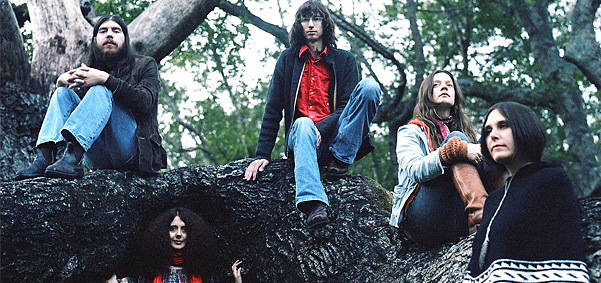Espers Everywhere Now: Beloved Philly psych-folks reflect on life ahead of their hometown reunion

Espers | photo by Alissa Anderson | courtesy of the artist
Family. Work. Relationships. Relocation. Life.
These are things that closed a chapter on Philadelphia’s Espers in 2010, not long after the release of its final album, III, in 2009. “It might have been 2010, maybe sooner, like toward the release of the album, I’m not certain,” said Meg Baird, the one-time singing Epser(s) of how the band dissolved.
And that is it: Espers gently faded out just as they faded in, on a billowing, beautiful, undoubtedly dark and cumulous cloud of psilocybin-laced folk touched by occasional thunderbolts of electricity. Now, with the looming possibility of reissues of its brief catalog — four woodsy, gauzy, tactile albums and EPs — co-Epsers Baird, Greg Weeks, Brooke Sietinsons, Helena Espvall and Otto Hauser return to their rural, ancient-to-the-future roots tied (and unmoored from) folk’s traditions.
Maybe it’s just for one night (August 24 at Union Transfer), but the pairing with the like-minded Andy Cabic and his band Vetiver is perfect. Cabic’s handcrafted, shapeshifting, urbane folk was introduced to the world in 2004, the same year as Espers initial album, and the two in the birth of the modern folk movement, unified by the (then) further adventures of newbies Devendra Banhart, Ólöf Arnalds, Animal Collective and Faun Fables, as well as the return of alternative folk elders such as Clive Palmer, Bert Jansch and Vashti Bunyan.
Calling from San Francisco, where she’s lived for six years, it is odd speaking with Baird about Espers presently, as we have discussed her solo work (albums such as 2011’s Seasons on Earth and 2015’s Don’t Weigh Down the Light) without ever discussing Espers’ slip into darkness.
“It’s strange talking about Espers now, but not in a negative way,” said Baird, days before leaving for Philadelphia and rehearsals with her old band. “More of it is surprising that we’re here. It has been good, nice, that we’re revisiting the old material, and I’m glad we are able to play music together again.”
When talk of new material became apparent, Baird states that she and Weeks discussed as much, but thought better of the prospect – for now. “We’re too scattered to the wind,” Baird said. At the same time reunion was still a glimmer in Espers collective; promoters had heard through the grapevine that reissues were forthcoming and that Espers pals in Vetiver were holding court for its anniversary.
Suddenly, the quintet that last made 2009’s Espers III began chatting reunion more seriously.
“As if we ever really broke up,” said Baird with a laugh. “I wouldn’t want to live that space again full time. But, Vetiver is celebrating its own anniversaries [2008’s covers album Thing Of The Past]. We played with them in the past. Otto plays in both bands. It was just magic timing us getting back together, or timing magic.”
Looking at the union of friends such as Vashti, Devendra, and Vetiver at that time, it was comfortable being part of a brother-and-sister hood of like-minded folk. “It was cozy, yes, but that’s not an unusual thing, having artists who plays similar music hanging and working together. “ Baird goes on to mention how the press (“but not you, A.D.”), picked up the gauntlet of eerie folk unification and placed it upon the music journalism mantle of its time in which to gawk at lovingly and preciously. “I think that probably a lot of musicians who were in that moment may have gotten burnt by some of the media, some of which was mean. Nobody likes being labelled. It was just people sharing. It was a nice moment, though, with all of us at once thinking and doing somewhat similarly. It gave underground and DIY scenes visibility they may not have had otherwise and [brought] artists out who may not have done so otherwise. It was all very positive for a spell there.”
Considering the foundational elements of Espers and what they did as a unit, Baird believes it allowed her to better understand an apply more collaborative elements in her own music going forward. “The solo work is a great outlet, but the magic of true collaboration, not to sound corny, is amazing,” she says. “What you can accomplish through that is bigger when you’re not focusing on yourself.”
There was not a pinpoint moment as to what folded Espers. They finished commitments to Espers III, and band members were on the move, and dealt with life issues. “And death. We had missed the memorial for our friend [Philly folk guitarist] Jack Rose, and that was weighing on us. There was just a lot of life change going on, and we just never reconvened. It wasn’t a discussion. It just stopped.”
It was like sand or dust. Espers blew away. Presently, that same sand has blown the way of Philadelphia and local rehearsal stages, where they’re just happy to be reunited and playing old songs, “rather than worrying about new ones. We all live in such scattered spaces,” stated Baird. “When we’re all playing together and flowing, and we’re getting to enjoy the music and the voices, it’s great. And in Philly, it is the people that will make this special.“
Before I go, Baird asks if there’s anything that needs further clarification. “Things get blurry and fuzzy in translation,” she noted. Yet, in my estimation, if Espers didn’t get blurry and fuzzy, it wouldn’t be them.
“Well said.”
Espers plays Union Transfer on Friday, August 24th; tickets and more information can be found at the XPN Concert Calendar.